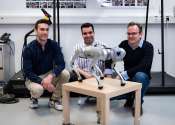Learning is acquiring new knowledge, behaviors, skills, values, preferences or understanding, and may involve synthesizing different types of information. The ability to learn is possessed by humans, animals and some machines. Progress over time tends to follow learning curves.
Human learning may occur as part of education or personal development. It may be goal-oriented and may be aided by motivation. The study of how learning occurs is part of neuropsychology, educational psychology, learning theory, and pedagogy.
Learning may occur as a result of habituation or classical conditioning, seen in many animal species, or as a result of more complex activities such as play, seen only in relatively intelligent animals and humans. Learning may occur consciously or without conscious awareness. There is evidence for human behavioral learning prenatally, in which habituation has been observed as early as 32 weeks into gestation, indicating that the central nervous system is sufficiently developed and primed for learning and memory to occur very early on in development.
Play has been approached by several theorists as the first form of learning. Children play, experiment with the world, learn the rules, and learn to interact. Vygotsky agrees that play is pivotal for children's development, since they make meaning of their environment through play.







